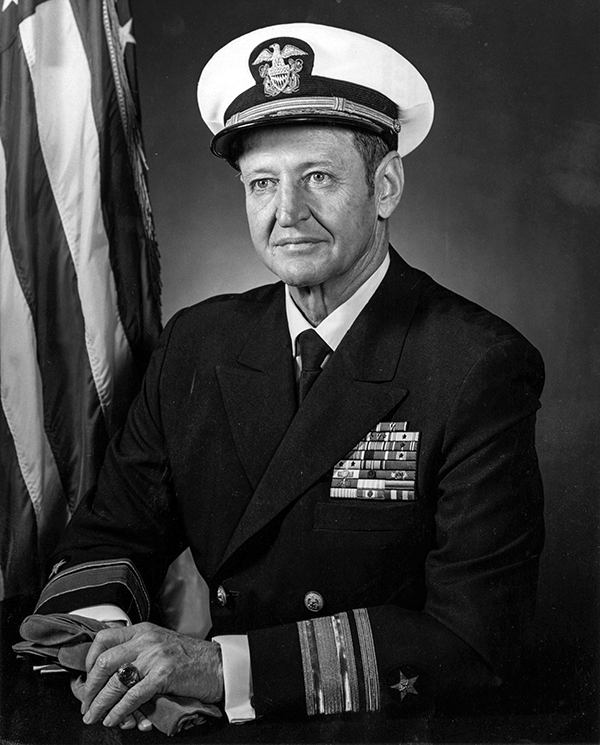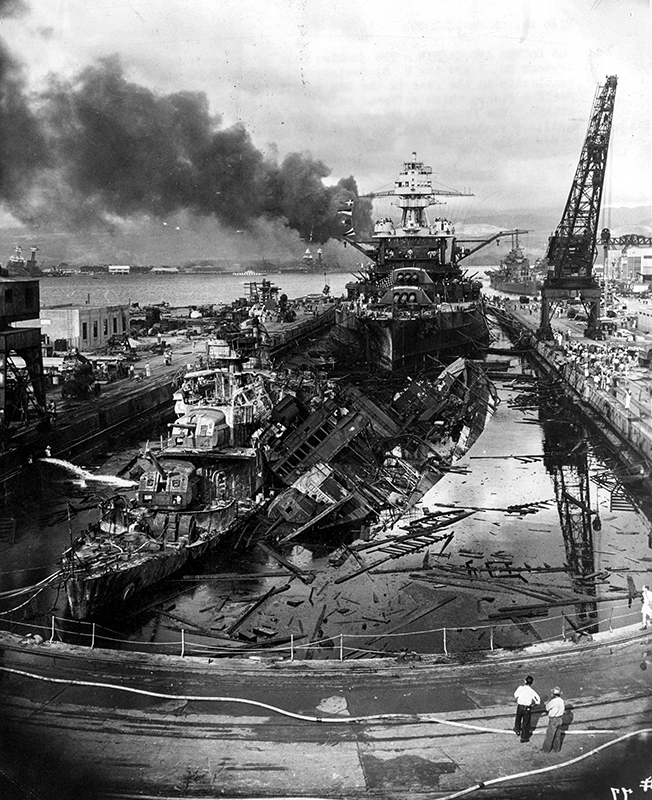
Erly, Robert B., Rear Adm., USN (Ret.)
(1914–2014)
This memoir emphasizes three principal legs of the tripod that dominated much of Admiral Erly's career: destroyer operations, amphibious warfare, and relations with other nations in the Americas. Erly graduated from the Naval Academy in 1937 and spent the next year in the battleship USS New Mexico (BB-40). He served on board the destroyer USS Conyngham (DD-371) in 1938-39. He received flight training in Florida in 1940 but was advised to return to surface ships, which he did. His service on board the destroyer USS Cassin (DD-372) in 1941 came to an end when the ship was badly damaged during the Japanese attack on Pearl Harbor. Erly directed firefighting efforts against burning ships. After temporary assignments around Pearl Harbor in late 1941-early 1942, Erly was in the commissioning crew of the destroyer USS Frazier (DD-607) in 1942. Because of his Spanish language capability, he reported in 1943 to advise the Cuban Navy on behalf of Commander Gulf Sea Frontier. He was executive officer of the destroyer USS Laub (DD-613) in the Italian campaign in 1944 when she collided with the light cruiser USS Philadelphia (CL-41). His first command, in 1944-45, was the destroyer USS Phelps (DD-360). He served in the U.S. naval mission to Venezuela, 1946-48; was executive officer of the destroyer tender Yosemite (AD-19) in 1948-49, and in 1949-50 was an instructor at the General Line School, Newport, Rhode Island. Erly recommissioned the destroyer USS James C. Owens (DD-776) in 1950 and commanded her until 1952, including service in the Korean War. In 1952-53 he was a student at the Armed Forces Staff College. He served on the staff of Commander Amphibious Group Two, 1953-55; served in OpNav, 1955-58; and was the first commanding officer of the attack transport USS Paul Revere (APA-248) in 1958-59. In 1959-60 he was on the Amphibious Force Pacific Fleet staff as operations officer; commanded Amphibious Squadron Five, 1961-62, and was a student in 1962-63 at the National War College. After service in 1963-65 as chief of staff to Commander Amphibious Force Pacific Fleet, Erly was selected for flag rank, and in 1965-66 served as Commander Amphibious Group Three and Commander River/Coastal Warfare Group during the development of riverine warfare doctrine. He served 1966-68 in OP-63 as coordinator of inter-American affairs, naval missions, and MAAGs. From 1968 to 1972 he served on the Atlantic Fleet staff, first as inspector general, and later as Deputy Chief of Staff for Plans and Operations. His final active tour, 1972-74 was as Commander Iberian Atlantic Command and Chief of the Military Assistance Advisory Group in Portugal.
Interview
In this selection from his second interview with Paul Stillwell at the U.S. Naval Institute on 7 September 1988, Admiral Erly recounts his arrival by car in the middle of the air raid on Pearl Harbor and his efforts to fight the fires on the drydocked destroyers USS Cassin (DD-372) and USS Downes (DD-375) and the battleship USS Pennsylvania (BB-38)on 7 December 1941.
Admiral Erly: This little fellow really didn’t want to head back, but he did, and dropped me at the main gate at Pearl. Then I went down to the ship, the Cassin. I was in civilian clothes. She’d been hit. There was fire in the bottom of the dock.
Paul Stillwell: Had the dock been flooded yet?
Admiral Erly: No, no. About this time some firefighting equipment arrived from the submarine base. I grabbed a bunch of people, and we went on the firefighting truck. We had been on the Cassin’s side of the dry dock. I took it around the other side and we hooked up the hose on the Downes’s side. The Downes had been hit, this time by a bomb, and it had hit on a torpedo tube, so she was really blazing. The fire was up around her depth charges. So we got the hose led out. I had it directed right on the Downes’s depth charges. It ended up there were two people from the sub base with me, a little Filipino and an electrician’s mate, and then I was watching this thing. We were sitting right on top of the depth charges. I said, “Well, hell, there’s no sense in three of us being blown up. Look, you two go back and get another hose. We need more up here. I’ll keep this hose on the depth charges.”
I weighed about 200. There was a lot of pressure on the hose, so I lay down on that hose, keeping the water aimed at the depth charges, keeping them cooled down so they wouldn’t blow and blow the stern off the Downes and Cassin and blow the bow off of the Pennsylvania.
Paul Stillwell: You were still in civilian clothes at this time?
Admiral Erly: Oh, yes. About this phase, with the flame and the smoke, I took my coat and wet it, and sort of had it over my head. I stayed on that thing for—it was a real weird situation. You think, “Oh, Christ.” You’re looking at it and said, “Hell, it’s going to go any minute.” And it didn’t go.
Paul Stillwell: Was anybody directing this effort, or was it individual effort?
Admiral Erly: No. I did this. No one came from the Pennsylvania. I could see that if those depth charges went, it was really going to wreak havoc, and that was my main concern. I must have stayed on that hose, it seemed like forever, and then was hoping the other hoses were going to come up. After a period of time, I found that I could lash it to an iron stanchion, went back, and they were struggling with another hose, got on the other hose and got another hose up there with them. I guess Dan Shea, the skipper, had been working from the other side, and about this time frame, also, they started flooding the dock, and, of course, then the Cassin toppled. And then about this time frame, also, some people from the Pennsylvania came out and gave us a hand. Before that, nothing.
Paul Stillwell: Was there any air attack still in progress at this time?
Admiral Erly: Yes, sporadic. Maybe that’s why they didn’t. Time frame I’ve lost. The time frame I don’t remember, or even then.
Paul Stillwell: Your attention was pretty well focused on that hose.
Admiral Erly: Oh, yes, thinking it was going to be my last attention. Once you started flooding, that sort of took care of that situation.
Then I realized the Shaw was in trouble. There was a submarine down at the pier adjacent to Ten-Ten Dock.[1] I went and got an engineer. I forget the name of the submarine, but Otis Cole was the OOD.[2] I told him I needed an engineer who could operate a whaleboat, because then we had other hoses. I got in the motor whaleboat as coxswain with this engineer. We got a charged hose and towed it out to the Shaw. She was in a floating dry dock.It’s bugging me now, did I or did I not ever get that engineer recognized? I don’t believe I did. There were basically two men who were with me on the hose that I kicked off, and I said, “Get out of here. There’s no sense in three of us going. You get out and get some other hoses here, and maybe it’ll help. Get another hose.”
I did get them recognized for their actions. They were both advanced in rank at a meritorious mast for their actions. I did get that over to the sub base. They were submarine people. But I think I missed the engineer, come to think about it.
Paul Stillwell: Had she already exploded by the time you got there?
Admiral Erly: Yes, the bow had gone. She’d lost her bow at this point, and this is why the fire. About this time I was getting a little tired, I do believe.
Paul Stillwell: I’m not surprised.
Admiral Erly: After that, I guess we came back. Of course, by this time I pretty well looked like I’d been dragged through an oil field, and I went aboard the Pennsy. Someone said, “Oh, you can’t come aboard.”
I said, “Here,” and showed them my ID. So they went below, got pants from somebody, a shirt from somebody, a cap from somebody, shoes, and got rid of what I was wearing. I got cleaned up somewhat, showered and scrubbed.
Paul Stillwell: Were your personal effects lost?
Admiral Erly: Yes, everything.
Paul Stillwell: What was the nature of the casualties on board the Cassin? Did the ship lose many people?
Admiral Erly: No, Cassin didn’t lose any. Downes lost a group up in chiefs’ quarters. When they got hit and the fire started, they moved forward, and that hatch on that Mahan type didn’t have an escape scuttle that came up out of the chief’s quarters. It had been dogged down. See, they dogged down anything, and they got in there and they were just roasted.
Paul Stillwell: Nowhere to go.
Admiral Erly: Nowhere to go. They couldn’t come back out the other way. And so they took the casualties on that. The Cassin, evidently, had not that many people on board, and thank God, and the same thing on the Downes. Cassin people, we lost not a soul. Everybody got off. See, you had your liberty party and then you’re right there.
What was really happening, if it hadn’t, as I look at it, you can think the Japs were really under pressure, too, as you can imagine coming in there. If any one of those pilots had thought, “Hey, if I hit the dry dock caisson, I’ll destroy or damage the battleship and smash the two destroyers.”
They were really zeroing in on the battleship, and they only put one bomb in the battleship. And would you believe it, it had Jimmy Craig on it, who had been my last skipper in Conyngham. He had only been in “Pennsy” a short time as damage control officer, and it nailed him and part of his damage control crew in the Pennsylvania.[3] So they only put one bomb in the “Pennsy.” All the rest, they were overshooting; where if they had undershot and got in the caisson, that rush of water in there would have caused more damage than really happened. You would have jammed everything in there. You would have probably never been able to salvage anything from the two destroyers, and the battlewagon would have been pretty well damaged. So you can see the Japanese were not so calm, cool, and collected, either.
Paul Stillwell: You were then a man without a job.
Admiral Erly: I was a man without a job.
[1] Ten-Ten Dock, which was part of the Pearl Harbor Navy Yard, was so named because it was 1,010 feet long.
[2] Lieutenant Otis R. Cole Jr., USN, USS Cachalot (SS-170).
[3] Lieutenant Commander Craig was killed that day.
About this Volume
Based on six interviews, conducted by Paul Stillwell from May 1987 to April 1992. The volume contains 459 pages of interview transcript plus a comprehensive index. The transcript is copyright 2015 by the U.S. Naval Institute; the interviewee placed no restrictions on its use.




